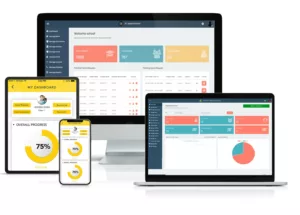Importance of Effective Communication in Education
What is the importance of Effective Communication in Education? It ensures that students, teachers, and parents stay informed, engaged, and connected. Clear communication helps meet student needs, enhances collaboration, and fosters a supportive learning environment.

What is Effective Communication?
Effective communication is the ability to share information in a clear, concise, and understandable manner. It goes beyond simply exchanging messages—it involves active listening, timely responses, and fostering meaningful interactions. In an educational setting, effective communication ensures that students understand their lessons, parents stay informed about their child’s progress, and teachers can efficiently convey expectations and feedback.
In this article, we will be exploring the challenges of traditional communication methods in schools, the benefits of School Management Systems (SMS), and the key features that improve communication in educational settings. Let’s dive in.
Challenges of Traditional Communication in Schools
Traditional communication methods such as in face-to-face meetings, phone calls, and printed newsletters have been widely used in schools. However, they come with several challenges, which include:
1. Time-Consuming
Scheduling meetings can be difficult, especially for parents and teachers with busy schedules. Finding a mutually convenient time often leads to delays in communication.
2. Limited Accessibility
In-person meetings and phone calls are restricted to specific hours, making it hard for parents with non-traditional work schedules to stay involved in their child’s education.
3. Risk of Information Loss
Printed newsletters and paper-based communication can be misplaced or forgotten, leading to missed updates on important school events, assignments, or policy changes.
4. Lack of Real-Time Updates
Traditional methods do not provide instant communication, which can delay responses to student concerns, emergency alerts, or school-wide announcements.
How School Management Systems Improve Communication
School Management Systems (SMS) offer a digital solution to these challenges. These platforms provide a centralized space where students, parents, and educators can communicate effectively. Schools that transition to digital communication benefit from:
1. Improved Efficiency
Streamlined communication reduces delays and ensures quick information sharing between teachers, students, and parents.
2. Greater Accessibility
Instant messaging, automated notifications, and online portals make communication more flexible and inclusive, allowing parents to stay informed anytime, anywhere.
3. Stronger Engagement
Regular updates on student progress keep parents and teachers informed, fostering a more involved and supportive learning environment.

5 Key Features of School Management Systems
Modern school management systems include several features that enhance communication:
1. Real-Time Messaging
Enables instant communication between teachers, students, and parents, allowing for quick updates and immediate responses to concerns.
2. Parent and Student Portals
Provide secure access to grades, assignments, and academic progress reports, ensuring transparency and accountability.
3. Automated Notifications
Sends reminders about assignments, meetings, and school events, reducing the chances of missed deadlines or important announcements.
4. Event Scheduling and Reminders
Helps parents and teachers stay updated on key school events, improving attendance and participation in activities such as parent-teacher meetings.
5. Document Sharing
Ensures students and teachers can easily exchange learning materials, assignments, and school policies in a digital format for better accessibility.
How SchoolTry is Transforming School Communication
SchoolTry, a leading School Management System, has helped schools overcome communication barriers and improve engagement. Schools using SchoolTry have reported:
1. Higher Parent Participation
Schools saw a significant increase in parent involvement during meetings due to real-time messaging and automated notifications.
2. Better Academic Performance
Students and parents receive frequent academic updates, which has led to a reduction in missed assignments and deadlines.
These success stories demonstrate the importance of effective communication in education.
Conclusion
In essence, traditional communication methods often fall short in meeting the needs of modern education. School Management Systems like SchoolTry provide efficient, real-time, and accessible solutions that keep students, parents, and teachers connected.
By embracing digital tools, schools can improve student outcomes, enhance parent involvement, and create a more collaborative learning environment. The future of education depends on seamless communication, and adopting the right technology can make a lasting impact.
Are you a school administrator in need of a web solution like SchoolTry to automate, digitise, or transform your schoolwork? Register for free here and see how it works.




